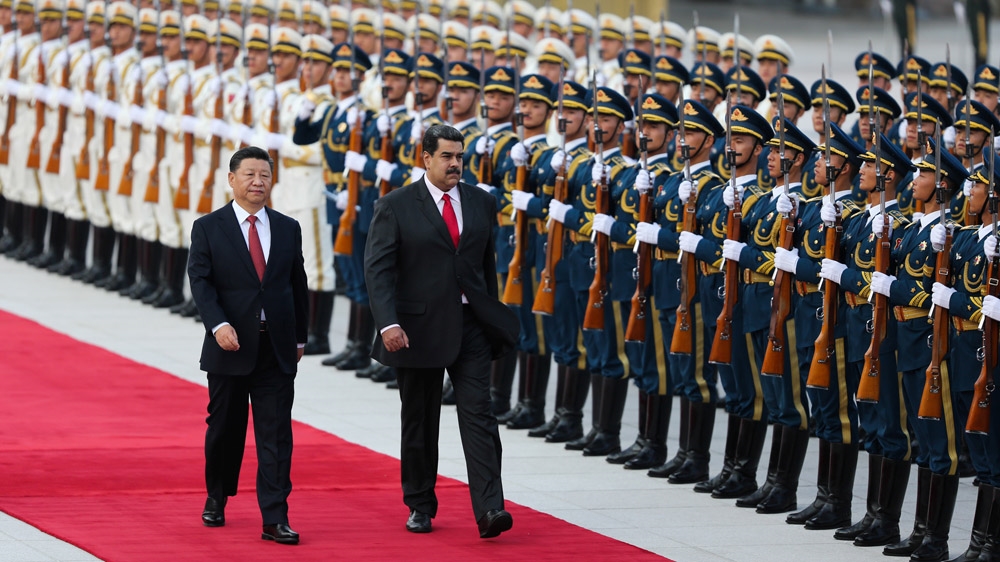
The head of Venezuela’s opposition-controlled parliament challenged President Nicolas Maduro on Friday, saying he is ready to assume country’s presidency himself until free and fair elections can be held.
Juan Gerardo Guaido Marquez made the announcement at an anti-government rally in the capital, Caracas on Friday, a day after Maduro was sworn in for a second term, deemed by many as “illegitimate”.
Guaido, who leads the internationally-recognised National Assembly, said there was no doubt that Maduro was a “usurper” and called for the support of the public, armed forces and international community in restoring constitutional order to Venezuela.
“I assume the duty imposed by the Constitution and Article 333, which obliges all Venezuelans, vested with authority or not, to fight for the restitution of constitutional order,” the National Assembly quoted Guaido as saying in a series of posts on Twitter.
“The Constitution gives me the legitimacy to exercise the charge of the presidency of the Republic to call elections, but I need the support of the citizens to make it happen,” he said before calling for massive protests on January 23.
The date is significant for Venezuelans as it marks the anniversary of the end of the Marcos Perez Jimenez dictatorship, which ruled the country from 1948-1959.
The call from the opposition comes a day after Maduro began his new six-year term following a controversial win in a 2018 election that was largely boycotted by the opposition.
Maduro dismissed the National Assembly as a “show of little boys”, telling reporters that while the “crazy and immature minds at the head of the opposition” were holding their demonstration, he was working.
Iris Valera, Venezuela’s minister for penitentiary affairs, said she already has a cell ready for Guaido.
“I hope you quickly name your cabinet to know who will accompany you,” she said on Twitter on Thursday.
Rising discontent
Friday’s move is the latest in a series of attempts by the National Assembly to dislodge Maduro by legal means, which have so far been unsuccessful.
Under Maduro, the parliament has been stripped of its powers and effectively replaced by the Constituent Assembly, which Maduro has stacked with supporters.
Maduro’s administration does not recognise the National Assembly and vice versa.
“What is happening now is the articulation of competing political forces within the country,” Venezuelan journalist Nayrobis Rodriguez told Al Jazeera.
“The National Assembly’s action will be quick since it is also supported by unions, businesses and social groups […] but it does not have military support and this weakens any attempt to assume the presidency,” she said.
Venezuela’s armed forces renewed their pledge of loyalty to Maduro at a parade following the swearing-in ceremony on Thursday.
 |
| A recent survey found 72 percent of Venezuelans wanted Maduro to resign [Manaure Quintero/Reuters] |
Public sentiment towards the ruling administration continues to sour as the country’s prolonged economic crisis, which has seen soaring hyperinflation and widespread shortages of food and medicine, shows no signs of slowing.
A recent survey by the country’s most reliable pollster, Datanalisis, found that nearly 72 percent of people wanted Maduro to resign, rather than begin his second term.
“Popular discontent can be decisive in defining the situation in the country and there is a high probability that citizens will join the protests,” Rodriguez said. “But it is also a population decimated by the diaspora and the fear of the harsh repression exercised by the government against the demonstrators”.
International response
Guaido’s comments have been welcomed by the Organization of American States (OAS), who declared Maduro’s government illegitimate in a special session on Thursday.
“He [Guaido] has our support, that of the international community and the people of Venezuela,” Secretary-General Luis Almagro said in a statement on Twitter.
We welcome the assumption of @jguaido as interim President of #Venezuela in accordance with Article 233 of the Political Constitution. You have our support, that of the international community and of the people of Venezuela #OEAconVzla https://t.co/6MgJtbvMFd
— Luis Almagro (@Almagro_OEA2015) January 11, 2019
The United States, European Union and several Latin American countries have also refused to recognise Maduro’s government. Peru and Paraguay withdrew their diplomats from Venezuela shortly after the inauguration.
However, amid the increasing international pressure, Maduro has been courting other allies.
“Russia, China, and Turkey all play crucial roles in propping up the Maduro regime economically. All have investing significantly in the country – Russia recently pledged $5bn to increase Venezuelan oil production, and Turkey has become a major importer of Venezuelan gold,” Max Klaver, senior analyst at Foreign Brief, a geopolitical risk analysis website, told Al Jazeera.
“As long as these three countries continue to back Maduro, there is little the international community can do to unsettle him without significantly hurting Venezuelan citizens in the process,” Klaver said.
 |
| Maduro has been strengthening ties with China, Russia and others [File: Miraflores Palace Handout via Reuters] |
Venezuela’s position as a major oil-exporter also reduces the risk of international backlash taking a harsher form than verbal condemnations, despite threats by leaders including US President Donald Trump and Jair Bolsonaro that military intervention could be an option to remove Maduro.
“At this point, the international community should look to help Venezuelans who are fleeing the country by providing asylum,” Klaver said.
“Likewise, as long as the military remains loyal to Maduro, which is does through established patronage networks, his ouster will be unlikely.
“Expanding sanctions on high level Venezuelan officials, especially those in the military and political elite to try and shake their loyalty to the regime, would also be feasible measures the international community could take to pressure Maduro without seriously harming Venezuelan citizens”.












